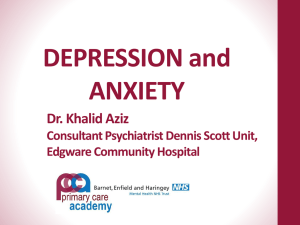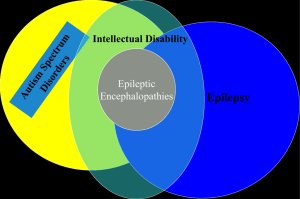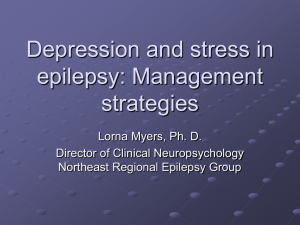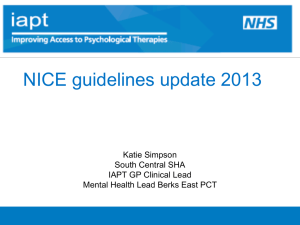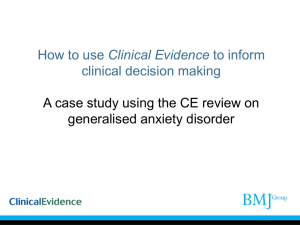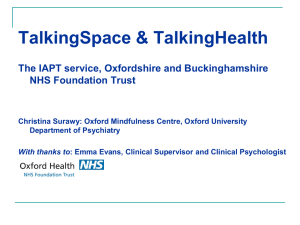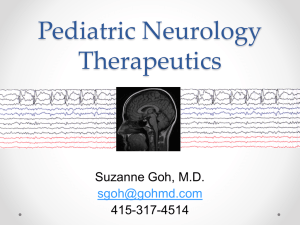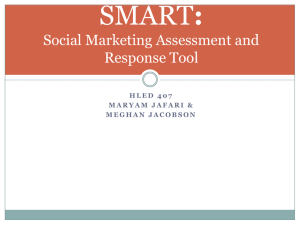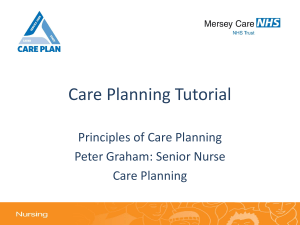Information Literacy Cycle Step 1 - The Institute for Research and
advertisement
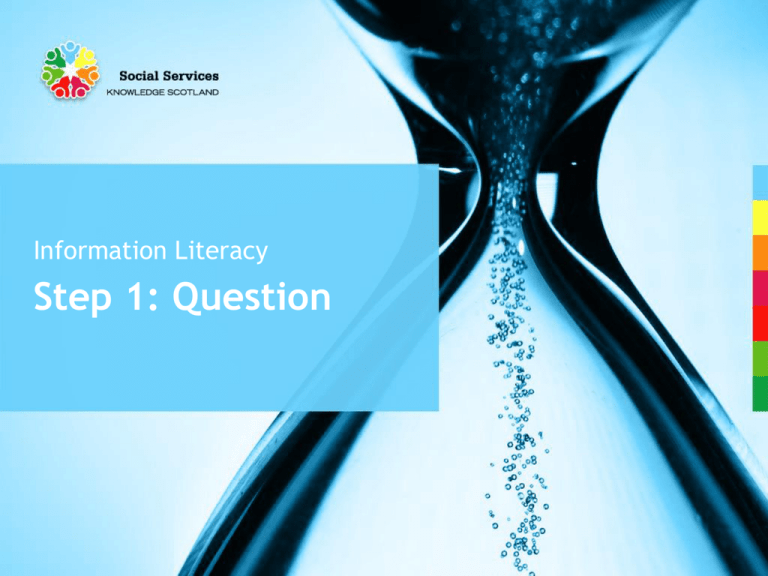
Information Literacy Step 1: Question Question • What do you need to know? Taking some time to work out what you really want to know can be one of the most important – yet one of the most neglected – steps in finding relevant information. Defining the question related to your information need is vital to finding the right solution: put simply, to get the right answer you must ask the right question. Learning outcomes This unit aims to support you to develop skills associated with the Question step of the information literacy cycle. It will enable you to: • Convert an information need into a question or statement • Understand what a ‘key’ term is • Identify the ‘key’ terms in a question or statement • Generate equivalent terms which mean the same as the ‘key’ terms and might be alternative search terms • Draw up a table listing ‘key’ and alternative terms Formulating a search question: The more focused your search question the easier it will be to find relevant information to help you with your information need. The examples here will show you how to recognise an information need, break it down into its component parts, identify key terms and create a search question. Scenario 1 • You’re working with a 56 year old woman who has recently been diagnosed with epilepsy and has been told she will be banned from driving. She’s so stressed by the diagnosis she can’t recollect what the medical staff told her about whether she will lose her licence, when she might get her licence back, or whether there might be help towards travel costs. Components It can help to break down the details of your information need into its component parts. For example: • What is the issue you’re interested in and who does it affect? • What are the outcomes you’re interested in achieving? • In this case the issue you’re interested in is epilepsy and the effects on your service user’s ability to drive. The outcomes are accurate information about laws or regulations affecting epilepsy and driving; and about any financial assistance a person with epilepsy might be entitled to whilst prevented from driving. Possible search questions • What does the law say about epilepsy and driving? • What financial help or support can a person with epilepsy access whilst banned from driving? Scenario 2 • You’re working with a 9 year old boy with autism. Over the last few months he has been having trouble sleeping which is making his behaviour increasingly challenging and his parents are struggling to cope. Components • What is the issue you’re interested in and who does it affect? • What are the outcomes you are interested in achieving? • In this case the issue you’re interested in is autism, sleep disturbance and parental coping skills, and you might be interested in achieving the outcome of improved sleep and/or better parental coping skills. Possible search questions • How does autism in children affect their sleep patterns? • What interventions can help improve sleep for children with autism? • What interventions can support parental coping skills? Scenario 3 • You’re working with a 21 year old woman with mental health problems including depression and anxiety. Her GP has suggested drug therapy but she is reluctant and is interested in trying cognitive behavioural therapy (CBT) as an alternative. She asks you which therapy is more effective in treating depression and anxiety. Components • What is the issue you’re interested in and who does it affect? • What are the interventions or approaches you’re interested in finding out about? • What outcomes are you interested in? • In this case the issue you’re interested in is depression and anxiety in young women; the interventions or approaches you’re interested in are those interventions which evidence suggests might be most effective in treating depression and anxiety in young women; and the outcome you’re interested in is a service user who is better informed about available treatment choices and thus empowered to negotiate with her GP. Possible search question • What does evidence suggest is the most effective treatment for young women with depression and anxiety? • Are there any negative consequences or contraindications for the use of drug therapy or CBT with young women? PICO • Scenario 3 is a bit different from the previous ones because you’re interested in the comparison of two interventions (drug therapy and CBT). When you have search questions that include comparisons it can be useful to use the stepwise PICO process (Sackett et al., 1997) and ask yourself the following questions: PICO • Population (who is the question about?) • Intervention (which intervention / approach is involved?) • Comparison (what do you want to compare?) • Outcome (what is the desired outcome?) 2. Search terms Key terms are the most important words in your search question, for example: • What does the law say about epilepsy and driving? • How does autism in children affect their sleep patterns? • How effective is drug therapy compared to CBT in treating depression and anxiety? • Key terms can be used to search for information when you put them into a search box. Activity 1: Key Terms Identify the key terms in the following search questions: • Which interventions equip some families to cope better with adolescents who have severe and complex disabilities? • What support groups are available for young carers of parents with multiple sclerosis (MS)? • Is cognitive behavioural therapy more effective than drug therapy for treating anxiety? • How effective are community based interventions in reducing substance misuse in young people? Equivalent terms • Key terms in your search question can be used as search terms. However, it is also important to consider that search terms can have equivalents or alternatives and depending on the search terms you decide to use, different results can be returned. For example: Search term Equivalent terms stress anxiety, worry, pressure, strain work Employment, job, occupation Activity 2: Formulating a search question • 1. Think about a service user (or group of service users) with whom you are currently working (e.g. a foster carer looking after a teenage boy whose birth mother recently died.) • 2. Think of an issue relating to their situation that you would like to find out more about (e.g. the foster carer asking how best to deal with the teenage boy’s loss) • 3. Formulate a question on this topic (e.g. what’s the best way to manage bereavement with teenagers in foster care?) Activity 3: Identifying search terms • Based on the question you formulated in Activity 2, identify the search terms and equivalent terms you might use to conduct a search. • For example: Search terms Equivalent terms Bereavement Loss, grief, death Teenagers Adolescents, adolescence, teenage, young people Parents Parental, carers, mothers, fathers Further reading • Formulating Questions: http://128.118.88.253/instruction/ebpt07/step1/Step1_question.htm • Developing a Research Question: http://www.esc.edu/esconline/across_esc/writerscomplex.n sf/0/f87fd7182f0ff21c852569c2005a47b7 • Searching for Research: http://www.resmind.swap.ac.uk/content/04_finding/finding _02.htm • Internet social worker: search strategy: http://www.vts.intute.ac.uk/he/tutorial/socialworker/?sid=2745628&itemid=12066 References • Sacket, D.L., Richardson, W.S., Rosenbery, W., Haynes, R.B. (1997). Evidence-based medicine. How to practice and teach EBM. 1st ed. London: Churchill Livingston. Copyright & Credits (c) 2009 Institute for Research and Innovation in Social Services except where indicated otherwise. This work is based on and derived from Better informed for better health and better care. NHS Education Scotland, 2009 (http://www.infoliteracy.scot.nhs.uk/information-literacy-framework.aspx). CC-BY-NC. Except where otherwise noted, this work is licensed under a Creative Commons Attribution-Noncommercial 2.5 UK : Scotland License. To view a copy of this licence, visit http://creativecommons.org/licenses/by-nc/2.5/scotland/. This means that, unless indicated otherwise, you may freely copy and adapt this work provided you acknowledge IRISS as the source. Specifically: * The Information Literacy Cycle diagram may be copied but may not be modified without permission from NHS Education Scotland [contact: Eilean.Craig@nes.scot.nhs.uk] * The article reproduced with the permission of the Press Association may not be included in any derivative work.

